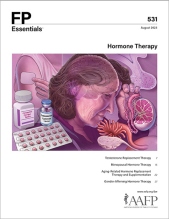
This clinical content conforms to AAFP criteria for CME.
Given their association with aging, growth hormone (GH), dehydroepiandrosterone (DHEA), and melatonin (N-acetyl-5-methoxytryptamine) have been evaluated as potential antiaging treatments. It has been hypothesized that declining endocrine function, specifically the decreases in hormone production and secretion seen with aging, plays a role in development of frailty. This physiologic decrease in hormone levels differs from a pathologic decrease due to a condition or disease. However, the signs and symptoms can be similar. Hormone replacement therapy is a well-established treatment for many conditions, but its role in the healthy aging process remains unclear. Off-label use of these hormones has shown some short-term benefits, such as improved body composition, mood, neurocognition, and sexual function and decreased oxidative stress. However, there are no recommendations for routine measurement of these hormone levels or for hormone replacement therapy because of a lack of high-quality evidence. Long-term studies are needed to evaluate the efficacy and safety of GH, DHEA, and melatonin if they are to be used as antiaging therapies.
Case 3. TJ is a 73-year-old patient who comes to your office for an annual wellness examination. He has no chronic conditions except for benign prostatic hyperplasia, which is managed with daily tamsulosin. TJ’s only concerns are that despite his well-rounded diet, consistent sleep habits, and avoidance of tobacco, he is unable to exercise for as long as he used to and does not feel as strong as he did previously. He wants to discuss options for supplements or treatments to help him feel young again and allow him to work out longer in the gym.
Subscribe
From $350- Immediate, unlimited access to FP Essentials content
- 60 CME credits/year
- AAFP app access
- Print delivery available
Edition Access
$44- Immediate, unlimited access to this edition's content
- 5 CME credits
- AAFP app access
- Print delivery available
